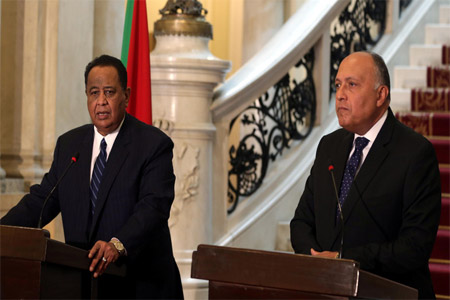
Afrasianet - A new round of talks held in Khartoum to ease Egypt’s concerns over a controversial dam that Ethiopia is building along the Nile have failed, a Sudanese minister said Friday.
The foreign ministers and intelligence chiefs of Egypt, Ethiopia and Sudan met in Khartoum on Thursday, and after nearly 17 hours of discussions they failed to reach an agreement on issues concerning Addis Ababa’s ongoing construction of the controversial Grand Renaissance Dam on the Nile.
“We didn’t reach an agreement,” Sudanese Foreign Minister Ibrahim Ghandour told reporters after the officials of three countries wrapped up their talks held at a luxury hotel in Khartoum.
“We spent the whole day talking as ordered by the leaders of the three countries, but we didn’t reach an agreement.”
“I can’t specify what the disagreements were, but they were technical issues,” Ghandour said as his Ethiopian and Egyptian counterparts refused to speak to journalists.
Ghandour also said that no new date had been fixed for the next round of talks.
The latest round of discussion had been held after leaders of Egypt, Ethiopia and Sudan met in Addis Ababa last month and agreed to break the months long impasse over the dam.
Ethiopia began building the $4 billion dam in 2012, but the mega project has triggered tensions primarily with Egypt as Cairo fears that once commissioned the dam will reduce water supplies from the Nile to Egypt.
Egypt relies almost totally on the Nile for irrigation and drinking water, and says it has “historic rights” to the river, guaranteed by treaties from 1929 and 1959.
Cairo argues that the treaties grant it 87 percent of the Nile’s flow, as well as the power to veto upstream projects. It fears that any reduction of water supplies to the biggest Arab country will affect its agriculture.
Cairo is primarily concerned at the speed at which the dam’s reservoir would be filled.
The Blue and the White Nile tributaries converge in Sudan’s capital Khartoum and from there run north through Egypt to the Mediterranean.
Initially Sudan too had concerns over the project, but in recent months has supported it, with experts saying that the dam will help regulate floods along Sudan’s share of the Nile.
The Grand Renaissance Dam aims to produce 6,000 megawatts of hydro-electric power -- the equivalent of six nuclear-powered plants.
The dam was initially expected to be commissioned in 2017, but Ethiopian media reports say only about 60 percent has so far been built.

